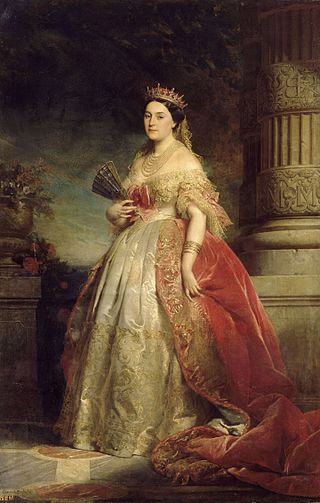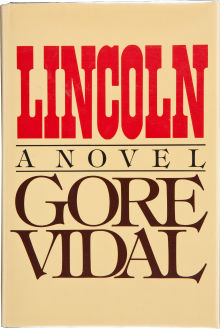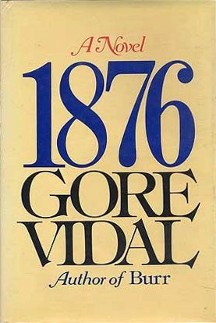
The 1876 United States presidential election was the 23rd quadrennial presidential election, held on Tuesday, November 7, 1876.

Samuel Jones Tilden was an American politician who served as the 25th governor of New York and was the Democratic nominee in the disputed 1876 United States presidential election.

Eugene Luther Gore Vidal was an American writer and public intellectual known for his acerbic epigrammatic wit. His novels and essays interrogated the social and sexual norms he perceived as driving American life. Vidal was heavily involved in politics, and unsuccessfully sought office twice as a Democratic Party candidate, first in 1960 to the United States House of Representatives, and later in 1982 to the United States Senate.

Mathilde Laetitia Wilhelmine Bonaparte, Princesse Française, Princess of San Donato, was a French princess and salonnière. She was a daughter of Napoleon's brother Jérôme Bonaparte and his second wife, Catharina of Württemberg, daughter of King Frederick I of Württemberg.

Burr: A Novel is a 1973 historical novel by Gore Vidal that challenges the traditional Founding Fathers iconography of United States history, by means of a narrative that includes a fictional memoir by Aaron Burr, in representing the people, politics, and events of the U.S. in the early 19th century. It was a finalist for the National Book Award in 1974.

The Golden Bowl is a 1904 novel by Henry James. Set in England, this complex, intense study of marriage and adultery completes what some critics have called the "major phase" of James's career. The Golden Bowl explores the tangle of interrelationships between a father and daughter and their respective spouses. The novel focuses deeply and almost exclusively on the consciousness of the central characters, with sometimes obsessive detail but also with powerful insight.

Lincoln: A Novel is a 1984 historical novel, part of the Narratives of Empire series by Gore Vidal. The novel describes the presidency of Abraham Lincoln and extends from the start of the American Civil War until his assassination. Rather than focus on the Civil War itself, the novel is centred on Lincoln's political and personal struggles. Though Lincoln is the focus, the book is never narrated from his point of view ; Vidal instead writes from the perspective of key historical figures. He draws from contemporary diaries, memoirs, letters, newspaper accounts, the biographical writings of John Hay and John Nicolay, and the work of modern historians.

The Electoral Commission, sometimes referred to as the Hayes-Tilden or Tilden-Hayes Electoral Commission, was a temporary body created by the United States Congress on January 29, 1877, to resolve the disputed United States presidential election of 1876. Democrat Samuel J. Tilden and Republican Rutherford B. Hayes were the main contenders in the election. Tilden won 184 undisputed electoral votes, one vote shy of the 185 needed to win, to Hayes' 165, with 20 electoral votes from four states unresolved. Both Tilden and Hayes electors submitted votes from these states, and each claimed victory.

Empire is the fourth historical novel in the Narratives of Empire series by Gore Vidal, published in 1987.

Katherine Jane Chase Sprague was a Washington society hostess during the American Civil War. During the war, she married Rhode Island Governor William Sprague.

The Golden Age, a historical novel published in 2000 by Gore Vidal, is the seventh and final novel in his Narratives of Empire series.
The Narratives of Empire series is a heptalogy of historical novels by American author Gore Vidal, published between 1967 and 2000, which chronicle the dawn-to-decadence history of the "American Empire"; the narratives interweave the personal stories of two families with the personages and events of U.S. history. Despite the publisher's preference for the politically neutral series-title "American Chronicles", Vidal preferred the series title "Narratives of Empire". The seven novels can be read in either historical or publication order without losing narrative intelligibility.

Henry Symes Lehr was an American socialite during the Gilded Age who was dubbed "America's Court Jester".

The 1876 United States elections were held on November 7. In one of the most disputed presidential elections in American history, Republican Governor Rutherford B. Hayes of Ohio ended up winning despite Democratic Governor Samuel J. Tilden of New York earning a majority of the popular vote. The Republicans maintained their Senate majority and cut into the Democratic majority in the House.

The 1876 United States presidential election in New York took place on November 7, 1876. All contemporary 38 states were part of the 1876 United States presidential election. Voters chose 35 electors to the Electoral College, which selected the president and vice president.
Nina Gore Auchincloss Straight is an American author, journalist, and socialite. She is the mother of writer/director Burr Steers and artist Hugh Auchincloss Steers, half-sister of Gore Vidal, step-sister of First Lady Jacqueline Onassis and socialite Princess Lee Radziwill.

The 1876 U.S. presidential election occurred at the twilight of Reconstruction and was between Republican Rutherford B. Hayes and Democrat Samuel J. Tilden. After an extremely heated election dispute, a compromise was eventually reached where Hayes would become U.S. President in exchange for the end of Reconstruction and a withdrawal of U.S. federal troops from the South.

The 1876 United States presidential election in Florida took place on November 7, 1876, as part of the 1876 United States presidential election. Florida voters chose four representatives, or electors, to the Electoral College, who voted for president and vice president.

William Archer Cocke was an American attorney and politician who served as the 13th Florida Attorney General. Cocke was placed into the national spotlight due to his role in the controversy following the 1876 presidential election.

















